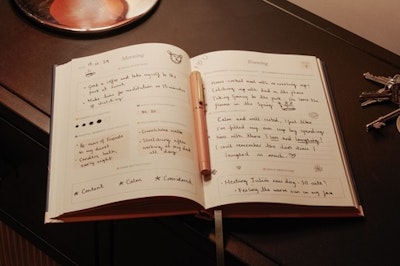1. Plan everything – in one place
Making a mental note, talking things through and setting a reminder here and a calendar event there are all well and good, but, it’s a bit scattered. There are plenty of fancy apps that you can use to map out your work, but here at Papier, we’re big advocates of writing it all down. For three reasons.
Number one, it means there’s a snazzy addition to your stationery arsenal that will make your desk look all the lovelier and the planning process all the prettier.
Number two, you can keep everything all in one place. Personalised planners come in all shapes and sizes so choose one that doesn’t just look the part, but has all the bits and pieces you need (like important dates, a diary, timetable, a note-taking section and so on) to quickly flick back to as and when you need.
And number three, the process of writing it all down really helps your schedule to sink in, so you develop a two-pronged planning system!








